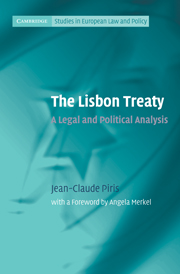Book contents
- Frontmatter
- Contents
- List of boxes
- Foreword by Angela Merkel, Chancellor of the Federal Republic of Germany
- Acknowledgements
- Table of cases
- List of abbreviations
- Introduction
- I The origins and birth of the Lisbon Treaty
- II General provisions
- III Democracy
- IV Fundamental Rights
- V Freedom, Security and Justice
- VI Institutions
- VII External affairs
- VIII Financial, economic, social and other internal affairs
- Conclusion: the Lisbon Treaty and beyond
- Appendixes
- 1 The judgment of 30 June 2009 of the Federal Constitutional Court of Germany on the Lisbon Treaty
- 2 The judgment of 26 November 2008 of the Czech Constitutional Court on the Lisbon Treaty
- 3 List of provisions on a simplified revision procedure and of passerelles
- 4 Existing legal bases switched to the ordinary legislative procedure (codecision)
- 5 New legal bases
- 6 List of Articles in the TEU and in the TFEU which enable the European Council to take decisions having legal effects
- 7 Existing legal bases switched from unanimity to qualified majority voting
- 8 Pre-existing legal bases where unanimity, common accord or consensus continues to apply
- References
- Index
2 - The judgment of 26 November 2008 of the Czech Constitutional Court on the Lisbon Treaty
Published online by Cambridge University Press: 05 June 2012
- Frontmatter
- Contents
- List of boxes
- Foreword by Angela Merkel, Chancellor of the Federal Republic of Germany
- Acknowledgements
- Table of cases
- List of abbreviations
- Introduction
- I The origins and birth of the Lisbon Treaty
- II General provisions
- III Democracy
- IV Fundamental Rights
- V Freedom, Security and Justice
- VI Institutions
- VII External affairs
- VIII Financial, economic, social and other internal affairs
- Conclusion: the Lisbon Treaty and beyond
- Appendixes
- 1 The judgment of 30 June 2009 of the Federal Constitutional Court of Germany on the Lisbon Treaty
- 2 The judgment of 26 November 2008 of the Czech Constitutional Court on the Lisbon Treaty
- 3 List of provisions on a simplified revision procedure and of passerelles
- 4 Existing legal bases switched to the ordinary legislative procedure (codecision)
- 5 New legal bases
- 6 List of Articles in the TEU and in the TFEU which enable the European Council to take decisions having legal effects
- 7 Existing legal bases switched from unanimity to qualified majority voting
- 8 Pre-existing legal bases where unanimity, common accord or consensus continues to apply
- References
- Index
Summary
In its judgment of 26 November 2008 (71 pages, 218 paragraphs), the Czech Constitutional Court concluded that the Lisbon Treaty and the EU Charter of Fundamental Rights are not in conflict with the Czech constitutional order.
It stressed that the Court had concentrated its review only on those provisions of the Treaty whose consistency with the Czech Constitutional order were expressly contested. Therefore it remained legally possible that a group of deputies or senators might submit a new petition on the constitutionality of other provisions of the Lisbon Treaty.
The Court stressed that the transfer of powers from State organs of the Czech Republic to an international organisation cannot go as far as to violate the very essence of the Republic as a democratic State governed by the rule of law, founded on respect for the rights and freedoms of human beings and of citizens. A transfer to the EU of the competence to define its own competences (Kompetenz-Kompetenz) would also be inconsistent with the Czech Constitution. However, the Court noted that the Lisbon Treaty does not have such consequences and it concluded that the Lisbon Treaty, together with the EU Charter of Fundamental Rights, is consistent with the Czech constitutional order. The Court stressed that the transfer of certain competences of the State to the EU, which arises from the free will of the State and which will be exercised with its participation, is not a weakening of the sovereignty of the State.
- Type
- Chapter
- Information
- The Lisbon TreatyA Legal and Political Analysis, pp. 359 - 360Publisher: Cambridge University PressPrint publication year: 2010



